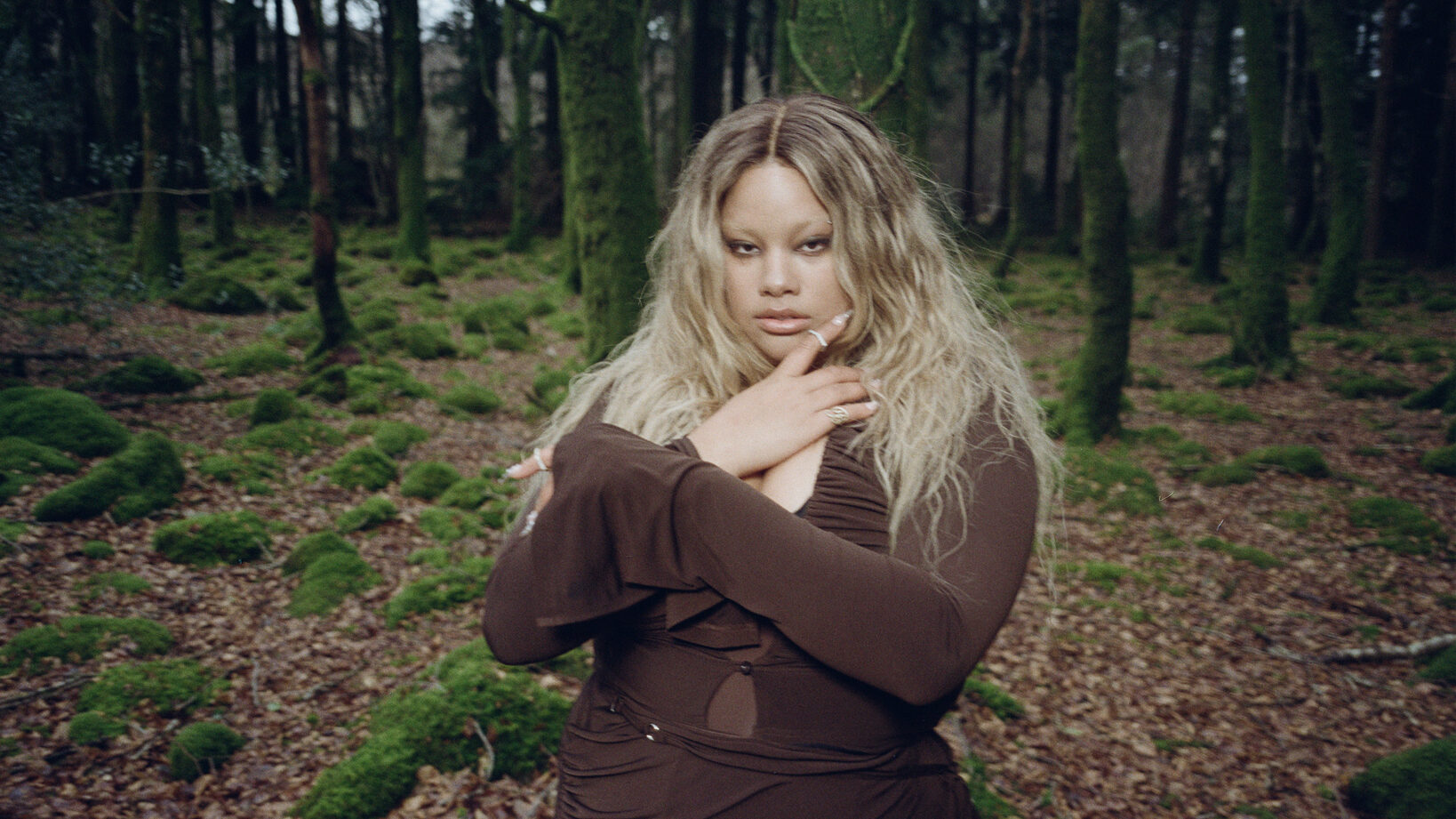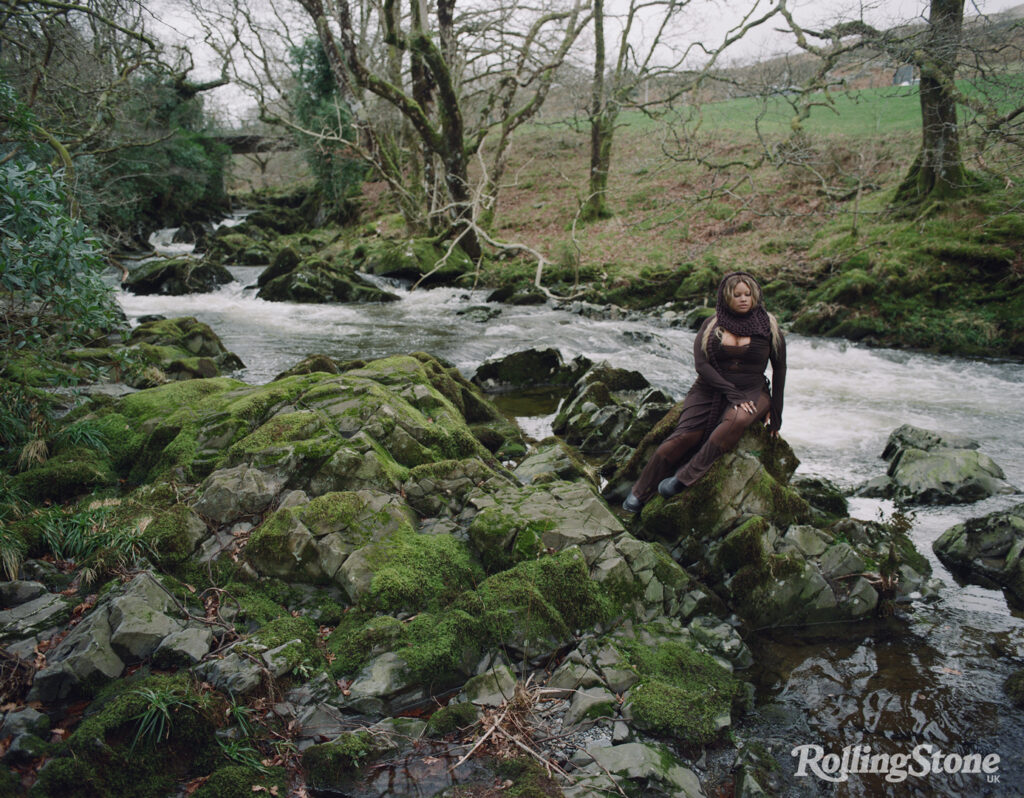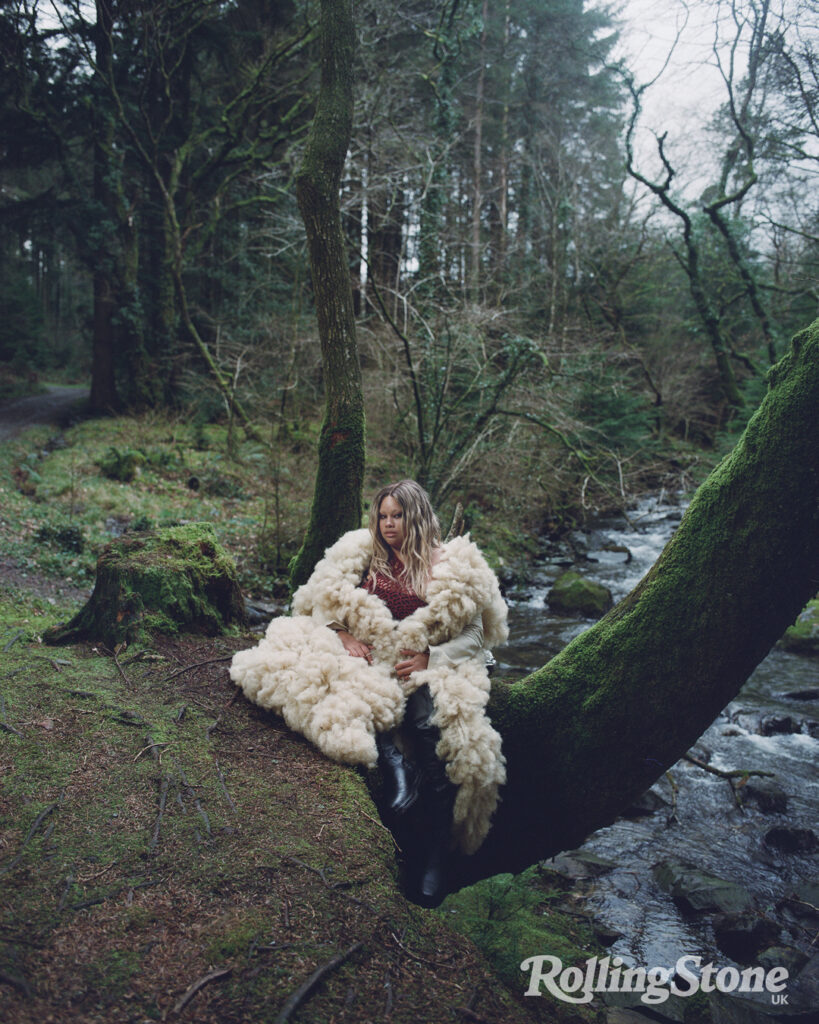Shygirl is hungry for everything
The rising UK star talks being censored for radio, women’s fear of their own genitalia, and the influences of nature and short stories on her debut album ‘Nymph’
By Hannah Ewens

There are female artists who perform with notable control of their voracious sexuality, and then there’s Shygirl, who keeps hers on a tight diamanté leash.
Blane Muise is hungry for everything: sex, experiences, travel and fun. If you watch her perform or have a conversation with her, she’s wryly smiling for most of it, like she knows something you don’t (and the joke’s probably on you). She came up playing London’s club scene and counts Rihanna as a fan. Her debut album was written quickly between late September and December 2021. Unlike her assertive and X-rated EP Alias, Nymph seduces you in order to tell you a story.
“This music takes its time a bit more and doesn’t rush into the room but does make a space for itself,” Muise says, calling from the hairdresser’s chair in London, pampering ahead of a trip to France for live shows. The 12 tracks of Nymph were created with her best friends including Arca, Mura Masa, and Sega Bodega, along with producers like Noah Goldstein, Danny L Harle, and BloodPop.
Sonically, it balances dark and light sounds, the twisted and the futuristic, and draws heavily from classic club tracks and wistful and expansive 00s pop. Forward-thinking co-creators aside, this record is Shygirl being softer, more vulnerable, and commanding your attention as Britain’s main experimental pop girl.
As a London party girl, what’s your experience of ‘post-pandemic’ clubbing been?
Shygirl: I have less anonymity. It was a weird experience re-entering those spaces and having people coming up to me when I didn’t even feel very able to talk to the people I knew. After being inside for so long, I didn’t realise what my audience was in real time. I just had internet feedback. I didn’t realise it was loads of people that were in the spaces that I went to. I enjoy people-watching myself, I don’t always enjoy being watched. Like with anyone, your journey with the club and nightlife should grow and change with you. It’s part of growing up. I used to party for days on end. I’d be out for, like, three days and go to work and people would be like, ‘How do you do it?’ Now if I was out for two days, I would literally die.
You said that when you were first making music you didn’t have the ability to speak in technical terms. Personally, as a consumer of culture, I gravitate to the work of novices — like when directors say, ‘We literally found these actors on Instagram.’ Do you think there’s something special that comes from being that person grasping to make something?
Shygirl: Everyone likes that type of thing because it’s like, ‘it could be you’. That’s what keeps life fresh when you feel like something could happen without you having any intent. The right thing can stumble on you or you can fall into it. I always had an interest in music, but never wanted to insert myself in it. Sometimes it’s been intimidating. What’s hard about the arts and a lot of spaces: people are really committed very early on and seem like they know something that you don’t and they can see their future fully formed. It’s definitely fine to just follow your interests and see how it goes.
“I hate censoring anyway but certainly in this context when it interferes with the messaging of the song. I hope that ‘Coochie’ normalises the experience of hearing about vaginas”
— Shygirl
Do you have more of that vocabulary now? Do you approach music in a more technical way?
Shygirl: I wouldn’t say I’m technically there and I think it still annoys people. Sega [Bodega, producer] said to me the other day, ‘You really should learn this’. And I’m like, ‘Why, when you do it?’ I read a lot and know a lot of words, but it’s enjoyable to have a space where I can be a bit clumsier and just stumble on things. It’s refreshing for me to have to engage with it in that way. I’ve pushed against that studious part of myself to not remove the magic of what music is to me because I’m still really in awe of it. Whenever I make a song, I’m like, ‘I can’t believe I just did that.’ The song just revealed itself to me in that way without it being a maths equation.
Your music demands pleasure and satisfaction from sex, people, and life. During the pandemic everyone had a sex and experience drought. We’re just so hungry for everything. Now we’re out of the pandemic, do people come up to you and say, I feel this hunger for experience and sex too?
Shygirl: So many people have come up to me and said ‘You’ve changed my life’. Obviously, that’s a lot of Americans who are very dramatic. With Alias, it was all very surface level, it wasn’t that deep, but that’s a privilege to be able to be playful and carefree. And that was always something that I really needed to tell myself that I could be in that time, too. So, I can understand how you can access my music in that way and be liberated. But moving into this kind of next phase with Nymph now, I want to be a bit deeper and vulnerable.

There aren’t any female UK artists I know of who write music about sex and sexuality in the way you do. Whereas America has got the likes of Megan Thee Stallion, Cardi B and others. Why do you think that is?
Shygirl: I think it’s the nature of what drives British music. I’m so used to hearing Americans talk like that about sex, and being more brash. I think it’s a cultural thing. British people are a bit more prudish [in art] — my idea of what it means to be British is about what is appropriate and what outward-facing image you present of yourself. And I guess that’s why I felt like I needed to kind of push against that a bit and say I’m not any lesser just because I want to talk about my experiences and what I derive pleasure from. Why should that be something that’s hidden or kept secret? It’s such a big part of who I am as a person.
The only thing I’ve noticed in some of the interviews I’ve done, is that I don’t really see so much where people are asking the Megan Thee Stallions and the Cardi B’s their thinkpieces on it, they just take the music for what it is. Whereas in the stuff that I’ve done, it has been contextualised a lot more.
You write about sexual experiences with people of all genders on Nymph. If you’re writing about sex with a man or a woman, do you find that you naturally approach them differently to make quite different songs?
Shygirl: I’ve probably written more about men — I’ve had more turbulent relationships with men than women that has maybe put me in a space to figure it out, musically. But I think I probably approach it differently because I have approached those relationships differently. There’s a lot more emotionally stunted men that I’ve had to pick up the slack for, and therefore regain composure in my songs, than I have with the women I’ve had relationships with. But I’m still figuring out my experience as someone who is attracted to more than one gender.
I like to draw from characters in novels and in film. They’re not obvious references, but references for me to be able to broaden those characters in my mind, and then build a story around that sonically. A lot of the tropes that already exist are heteronormative and the kind of media I’ve been exposed to growing up has been the presentation of male and female relationships. That’s why a lot of my writing does start from that space. Then we’ve got songs like ‘Coochie’, where I felt more able to build something in that song that sounded nice about my adoration and objectification of women and myself.
There have been so many instances in life where I’ve spoken about my experiences with women and other women have gone like, ‘Oh, I can’t imagine being with a woman like that,’ repulsed by the thought of having sex with a woman. That may say something about how you feel about yourself and your body as a woman. Especially talking about the vagina — so many women can’t even talk about it, but it’s a part of your body! How good it would have been if I was younger to have songs like ‘Coochie’ that sounded nice and spoke about it nicely. It’s definitely still a journey for me in how I’m able to articulate my experiences with women because I’ve had so many unhealthy relationships with men that I haven’t really wanted to always throw myself into that same space with women. And I’m probably more cautious in my relationships with women to not be the toxic individual.
I have also had so many of those same vaginaphobic conversations with straight women — it seems like it’s the first thing they are compelled to say. It’s like they think the vagina is monstrous, even the word itself.
Shygirl: I feel like coochie is such a soft, censoring word for the word vagina anyway, and I still had to censor that further for the radio. I understand if it’s vulgar but on this occasion, it isn’t at all. I would have preferred to see what the general public thought before censoring it, you know? I would have loved to have given them the opportunity to be outraged if they were, or to totally accept it. We need certain points to test that because maybe people 20 years ago would have been offended, but not now, and if they are, they should be able to have free will. But maybe even in talking about it, things will change for someone else. It’s only things that serve the male gaze that are fine — it’s still hard to assert the space as a woman to talk about my desire.
What did the song get censored to?
Shygirl: It’s cutie, or something lame. I hate censoring anyway but certainly in this context when it interferes with the messaging of the song. As an artist I want this song to be fun to engage with but I’m aware that when you put things out, it does have an effect and it’s not just a fun song. Sometimes it’s a song that’s necessary to exist. I hope that ‘Coochie’ normalises the experience of hearing about vaginas, basically.
Nymph feels darker and sexier in a different way. It’s like jumping into a really dark pool of water or something. Did you see this album as a shift from the last one?
Shygirl: I almost sidestepped part of my story in a lot of ways — the takeaway from Alias was that I’m a big, strong assertive woman and I forgot to tell you guys how I got to that space. Nymph tells us a bit more of that. It’s through being vulnerable, putting myself in precarious positions emotionally that I got to those themes of strength. I think it’s necessary for people to treat me nice to know that I’m a person. How can I expect an audience to be careful with me if I don’t tell part of that story?

I love that the visualisers for ‘Come For Me’ and ‘Firefly’ both make use of nature. So does the ‘Coochie’ video, in a way.
Shygirl: I’ve always found great satisfaction from just being in nature or being somewhere where I feel significant. I had this idea that I wanted [the visuals] to be super futuristic, but the sounds are futuristic so by the time it came to making videos, I wanted to root that in things that have existed forever and will exist beyond me. My connection with nature cements and finds power in who I am today because it is momentary — I am a momentary individual, but the things I’m doing are powerful and who I’m becoming in this moment. Many people have been that before me, you know, and will continue to do that afterwards. I think there’s something mythological about it and it really did feed into my interpretation of Nymph and what it means to me to be connected with these characters that have existed before.
The ‘Firefly’ video reminds me of those Nelly Furtado-type 2000s pop videos where female singers are in nature or have these big expansive backgrounds.
Shygirl: That’s definitely heavily my influence because of what I’m so used to seeing. Sometimes I enjoy dipping into a cliché because I haven’t seen myself do it — someone who looks like me do it. I never thought I’d be making music or doing pop star shit — it feels like I’m always cosplaying.
“I enjoy dipping into a cliché because I haven’t seen someone who looks like me do it. I never thought I’d be making music or doing pop star shit — it feels like I’m always cosplaying”
— Shygirl
What books did you read during writing Nymph that might have fed into it?
Shygirl: I really wasn’t reading that much but I was thinking back to the things that I had read previously but hadn’t really utilised. So, I was looking at romanticism and Thomas Hardy and this brutalist approach to romance and life and positioning things as nihilistic sometimes, or romanticising a dark experience. With romanticism you present all these harsh landscapes and its relationship to man and the futility of existence, the beauty of it. That’s what I’m trying to pick apart and put back together in this album. With ‘Firefly’ and ‘Woah’ there’s this idea of experiences that haven’t always felt good, but I find a good space at the end or accept that it’s futile, and then build my own environment around that visually. When you experience the album, each song has its place in the story of that. This is a landscape of my own, this is a space that I’ve handpicked purely to satisfy myself, and to give myself pleasure.
Have you found time to read now the album has been written and completed?
Shygirl: I’m reading Roald Dahl’s adult short stories and this [Mary Gaitskill] short stories book called Bad Behaviour. Short stories are the only thing my attention span can dig into since making music. In short stories, they don’t often bother telling you the beginning or the end, you’re just in the thick of it immediately. And I really enjoy that immediate gratification of having to figure out the landscape of a world without much context. You’re just thrown in there and things just have to make sense. I like giving my audience the benefit of the doubt that they can keep up with me. I hope this album does that.
‘Nymph’ is released 30 September via Because Music.
Taken from the October/November 2022 issue of Rolling Stone UK. Buy it online now.
